WITH OFF-HAND HINTS TOWARD THEIR CONDITIONS
BY MOSE VELSOR, OF BROOKLYN. OUR OWN REFLECTIONS ABOUT THE LATE FIGHT -- AND
[New York Atlas 21, No. 24
CONSIDERING THE IMMENSE prejudices of those who give the cue, we
do not so much wonder at the aversion which most of the intellectual
and benevolent members of the community feel toward Prize Fighting
as an "institution," and which has been called forth quite loudly and
generally by the late contest between Morrissey and Heenan. At first
thought, perhaps, it seems a savage and unchristian performance, for
two men to go deliberately to work, to pound and batter each other,
merely for the purpose of seeing who can stand the most "punishment,"
and do the greatest credit to his muscle, game and training. Yet (we
would suggest to the reader), the question is not so abruptly decided.
There are other considerations and arguments -- some of them quite
important. It appears, of late, as if all the indignation which might
justifiably be directed towards the sins of different departments of
modern life, theological, political, social, &c., were withdrawn from
the rest, and turned towards the performances of the prize ring, and
of those who "go in" for that amusement and branch of "science."
The vast understratum of the people, however, will continue to
gratify their tastes and impulses, irrespective of the tone of polished
society (so called). And it is useless to deny that, through the great
masses of men who form that understratum, there is a deathless interest in
these contests for physical superiority, whether expressed in a battle
between two ships-of-war upon the sea, or opposing armies upon
land -- or, on a smaller scale, between two trained specimens of
humanity in the prize ring. There is, we may also say in passing, not an
argument against the combat of the prize fight, that does not
equally apply to war -- to all war, at least, except that for the
purpose of resisting the invasion of a foreign foe.
For our own part, we believe in the necessity of those means that
help to develop a hardy, robust and combative nation, and desire to see
America in that list. We do not think that community able to take care
of its rights, and defend them successfully against all odds, where there
exist only peaceful, pious, respectable and orthodox citizens. There
must be something more. What, for instance, did ancient Rome rise
out of? How came she to be the commanding power of the world for
so many centuries -- the leader and master of all lands? Of course,
from a plentiful infusion of just about such temper and audacity as
congregated at Long Point, around the ropes that enclosed Morrissey
and Heenan, the other day. And the subject nations which Rome
conquered, one after another, in all directions, were conquered, in
many signal cases, because they disdained the fierce encouragements
to produce a race of men who could and would fight, not by rote
merely, but for the love of fight.
Do we then, (perhaps the amazed reader asks,) openly countenance
the training of men for prize-fighting? We answer, explicitly, we
do, (of course, no one but the writer of these sketches being responsible
or implicated in the opinion -- it being uttered for himself alone.)
It is about time to meet the floods of mawkish milk and water that are
poured out upon the land, and which, if justified and put in practice,
would crowd America with nothing but puny and feeble men, obedient,
pious -- a race, half, or perhaps wholly emasculated.
There is, of late years, an excess of philanthropy, which o'erleaps
itself, and falls on the other side. We believe it would be a first-rate
thing in New York, and all the other cities of the United States, if
the science of fighting were made a regular branch of a young man's
education -- and if the exhibition of contests for physical superiority
were common. Some such thing appears to be necessary, to meet the
morbid weakness we have alluded to ; it is, indeed, with other causes,
deteriorating the race, we sometimes think. It appears to have taken
possession of almost all the literary classes, and of the preachers and
lecturers.
Nor are we afraid of the Americans being too combative. That is
a matter which will regulate itself. There are too many varieties and
competitors, North, South, East and West -- and the mutual attrition
of each is beneficial to all the rest. This serves to keep each individual
part of it in its due place and proportion, without danger of successful
aggression upon the others. But especially in the commercial and
older settled states, we are free to confess we are sadly in fear of the
danger of seeing that "love of fight" we have alluded to, almost extinguished.
Some such suggestions as these, at least, are certainly called for to
counterbalance the tone of writing and expression which lately prevails
in select society, with reference to the principle of physical combats for
superiority -- as if there were not something inspiriting and honorable
in such a contest, as in others which involve different leading talents
and powers of humanity. Is there not even a high order of heroism in
the willingness and capacity to endure the most terrible blows of an
opponent, and stand up under them as long as the sinews of the body
answer the volition of the mind? Let others say what they will, we say
there is -- and we say, moreover, that it is a kind of heroism which we
need more of in these latitudes -- or rather we need the recognition of
it -- for we do not doubt there is plenty of the quality itself among the
common people.
No amount of cultivation, intellect, or wealth, will ever make up
to a community for the lack of manly muscle, ability and pluck. History is full of examples of intellectually developed nations, but intellectual only, falling a prey to others of inferior mental calibre, but of daring and overwhelming physique. Even Rome itself, in time, for such reasons, fell a prey to outside invaders far inferior to itself.
We will now proceed to draw a few inferences from the Morrissey
and Heenan fight itself :
Probably the best moral to be deduced from the late fight is, that
the quality of being able to endure any quantity of blows and bruises,
and hold out toughly under them, is what most tells, and gives the
final account of itself in a fight. This is what won the victory ; while,
on the other hand, we should say that, beyond question, no man who
has seen only twenty-two or three years, (Heenan's age,) is really fit
for the grandest exhibition of his bodily powers. The common opinion
that about that period of life affords the best show of strength and
endurance, under favorable circumstances, is unquestionably an error,
and a very great one. Five or six years more are required to give the
human frame its settled strength and knit -- and the friends of
Heenan ought to know this fact, and inculcate it in his mind, too.
If he wishes to hold out in the result, (not the beginning, mind, but
the result!) he must avoid overtaxing his powers too soon. The hard
oaken fibre of the frame does not come at his years -- or during the
earliest years anyhow.
The fight itself is, perhaps, the best illustration of what we say
here, and often have said. How splendidly Heenan began it! There
was, perhaps, never seen a finer show of determination, brawn, and
alertness than that much-talked-of "first round," and Heenan's part
in it -- giving his friends undreamed-of hope, and equally discouraging
to those of the opposite faction. It seemed as if there was no
standing against those quick and terrible blows. But there was ; and
that made the very fact which was to bear away the palm from him
who commenced so well. He began well, but could not hold out to
the last in proportion ; that spoilt all, and must ever spoil all.
The rule holds true in more cases than this of the prize fight. It
runs through all that is to be said upon the subject of physical training
for a man's health and vigor, and involves its most important bearings.
We say, therefore, that the late fight bears a great lesson in the fierce
attacks and defences of its rapid twenty-two minutes -- the lesson that
he wins who can "best stand grief," as the sporting fraternity quaintly
phrase it.
Or, in other words, in robust training for this life, which is itself a
continual fight with some form of adversary or other, the aim should
be to form that solid and adamantine fibre which will endure long and serious
attacks upon it, and come out unharmed from them, rather than
the ability to perform sudden and brilliant feats, which often exhaust
the powers in show, without doing any substantial good. We know
nothing of John Morrissey, but consider ourselves obliged to him, and
his theory and tactics of fighting, for a marked example of this main
element of our hints upon the general physical training of American
young men.
It is for such reasons, among the rest, that we dwell upon this
fight -- an illustration, as it is, of such practical details of diet, exercise,
abstinence, &c., as our foregoing papers would suggest for general use,
as far as may be -- because, of course, the actual necessity of this kind
of training, for fighting purposes, will never be the rule, but only the
exception. Still it is to be admitted that nothing short of a prize-fight
will ever bring the rules of manly health and training to that systematic
perfection which they are attaining, and out of which we, among
the rest, have been able to write these articles for popular use.
Just in the way as the institution of the horse-race, and nothing
less than that, brings the breed of the horse up to a far, very far, higher
pitch of physical perfection than could be attained by any other means
known or possible upon earth -- just exactly in the same way, (after
all the talk, pro and con, has been expended about it,) it remains to
be distinctly confessed that nothing short of these fierce manly contests, in
ancient and modern times, has led to the mightiest and most perfect development of the masculine frame, and proved what are the real rules consonant with its soundest physiology.
Therefore, in opposition to the views expressed by the editors
of the American newspapers, (the Atlas, we believe, among the rest,)
we say a stern word or two, not in defence of these fights only, but in
deliberate advocacy of them. We are writing just as fast as our pen can
gallop over the paper -- no doubt skip many of the points we should
like to make, on our side of the arguments, if we had time to stop and
arrange the said arguments in imposing array. At present we only
throw out our views, as the Tartar shoots his arrow, passing along at
full speed. But in some way, on some future occasion, we intend to
resume this subject, and present our views with more preparation and
effect.
By the way, the same papers that have such indignant editorials
about the fight are the very ones in which we have noticed, of late,
quite a good many articles bewailing the physical degeneracy of the
race of men in America -- statements that we are getting to have, in
our cities, and on all sides, too many inferior and feeble men. Why,
it is for the very reason, among the rest, that the tone of those who
assume to lead in public education, public opinion, the press, &c.,
sounds continually in the key it does, that there is indeed too much of
this same degeneracy. As we have before remarked in these off-hand
sketches, the spirit of American schools, authors, &c., tends to continually
develope the intellect and refinement of taste of the people, at
the expense of all their bodily stoutness, muscle, and their indifference
to little elegancies, niceties, and parlor and college models. We would
have this met and reversed. Not that we have any objection to the
colleges and the parlors -- they are, of course, well enough ; but they do
not afford that broad and earth-deep understratum that is necessary
for a nation with a resistless physique. Something a little more coarse
and rank is necessary. Let the tone of public taste, instead of refusing
any connivance with the vast undertow of popular sympathy with
these muscular combats, and all that appertains to them, be turned
to elevate and improve the said combats, and make them, it may be,
far better than they are, retaining, however, the same fierce energy
and combative science. We are not afraid to say, once again, that at
this present writing, we are decidedly in favor of some such course as
this.
As to the point of physical degeneracy here in the United States,
we do not, upon the whole, make much account of it. The nation is
passing through several important physiological processes and combinations.
To a great degree, it is yet getting acclimated -- especially in
the West, and on the Pacific coast, which latter is destined to have a
huge influence on the future physique of America. In its dry, wholesome,
life-giving and life-preserving atmosphere, the human form, it
may be, is destined to attain its grandest proportions, clearness, and
longevity. We allude to California and Oregon, and indeed the immense
inland stretch from Kansas down through Utah and Arizonia, to
the borders of Mexico. Here the air is dry and antiseptic -- everything
grows to a size, strength and expanse, unknown in the Northern and
Eastern States. Nature is on a large scale ; and here, in time to come,
will be found a wonderful race of men.
Before dismissing the subject of the late fight, we would once more
specially call the attention of the reader to the astonishing power of
the trained human body to endure and make light of, those indescribably strong and bloody attacks, blows, and bruises, which would be
certain death to half a dozen men such as we usually see walking the
streets of New York and Brooklyn. What a marvellous power this is,
which enables the human body to pass off, as if in sport, such a fearful
battering and pounding. We may, we say, learn a valuable lesson
here, and apply it to the warding off of disease, and in the usages of
every day life.
In the same train of thought, we would remark that the "sporting
men" of our American cities afford quite a study, in connection with
the subject of manly training. There are among them some of the
finest specimens of physique, in the world. Indeed, generally they are
a handsome race of men. You will see among them a number who are
quite advanced in years, yet in a good state of preservation. They are
generally distinguished by a certain smartness in their attire, quick
movements, and by a bold, sharp, and determined expression of the
countenance.
It is astonishing how much "fast life" many of these fellows go
through, and come out quite unharmed. Often, we have thought, they
set at defiance the ordinary rules of health and medicine, and baffle
what are supposed to be the surest canons of the laws of longevity --
coming out quite unscathed, and going on their ordinary course,
hearty and good-looking, as if nothing had happened. But it is to be
noticed, at the same time, that such specimens are of callous temperament,
reckless, without any of the attributes of the finer feelings, and
not disposed to stand about trifles, either of conscience or any thing
else.
We have sometimes even thought, while standing among a large
crowd of these sporting men, in some Broadway drinking saloon, or
some such place, and quietly observing their actions and looks, that
they presented about the best collection of specimens of hardy and
developed physique we had anywhere seen. Their movements remind
one of a fine animal. They have that clear, audacious, self-confident
expression of the eye, and of the face generally, which marks some of
the animals in a wild state. Notice the attitudes of them as they stand,
or lean ; the extended arm holding the glass of liquor, and raising it to
the lips ; the hat tipped down in front over the eyebrow ; the "gallus"
style generally. Or, see two of them square off at each other in a joking
way ; the limber vibration of the upper part of the body upon the waist ;
one foot planted forward ; the movements of the arms, and the poise
of the neck.
So much for the "sporting men," for they afford us a study, with
the rest. And, indeed, in casting our eyes around, we feel disposed to
take all the "muscle," indiscriminately, under our favor, and speak a
good word for it -- to counterbalance the disfavor which is so generally
shown toward it.
Of course the young reader, or any reader, will have sense enough
to understand that we do not pick out the life of a "sport" from all
the rest, and offer it to him as a pure model for him to follow, to the
rejection of the others. We express no opinion, and give no advice
about it. We simply call attention to the singularly perfect physique of
these men, in contradistinction to those shambling professional and
genteel persons, clerks, lawyers, pious students, correct youths and
middle-aged men, and the life -- pale, feeble, timid, quiet, dyspeptic,
and uninteresting generally, either for the company of man or woman.
And as to real viciousness, let no one suppose that it is confined to
any one class of the community, or is any more to be found in those
who "lead a gay life," than in those who keep demure faces, and are
supposed to be lawful and orthodox -- that is to say, the latter, in most
cases, add hypocrisy to the natural sins of man, and to the private
indulgence in the same.
Bill Weintraub to NW,
Hey Joe,
I was researching the importance of the glutes in explosive bodily
movements -- including boxing and pankration -- and came across this :
Fast forward to 1937, and college boxing had become a big deal at
Harvard. Boxing was at the same level as all the major collegiate
sports. The typical opponents were Harvard rivals at the time
including MIT, Yale, and Dartmouth.
It was around this time that both JFK and Norman Mailer were attending
Harvard and were part of the boxing program. Many view this time as
something of a Golden Era for the Harvard Boxing Team.
In 1941, a year after JFK graduated, the U.S. entered World War II. At
that time, Harvard made it mandatory for all undergraduates to
participate in intercollegiate boxing training as a way of improving
their wartime fitness.
To bolster the program, Harvard brought in the legendary boxing
champion Tommy Rawson. He led the program well into his 90s. In the
1940s and '50s, many of these collegiate matches would draw crowds of
10,000 people. In college sports popularity, this made boxing second
only to football at that time.
ALL GOOD THINGS
In 1960, following the death of a university student from injuries
received in the ring, the NCAA made the decision to do away with
boxing. This is even though football has seen similar tragedies over
the years -- and is scientifically proven to be more dangerous than
boxing.
NW to Bill Weintraub
Hi Bill,
That is a fascinating story.
I had read that WSU and UW were very much into boxing as a collegiate sport for many years. The schools were rivals in the sport. They packed the basketball arenas to watch it. Boxing in colleges was a big deal. It was gradually marginalized.
(In fact, in the early 1970s before I attended my high school, that same high school used to have boxing "smokers" at the high school auditorium every year. The term "smoker" came from the fact that the entire facility was filled with cigarette smoke during the event. I had heard other boys at grade school talk about going to the events with their dads. My dad, and of course my mother, would never have taken us to such an event. We were completely shielded from such things. I can remember back then I used to drool over sweating bloody boxers that I would secretly watch on TV on Saturday nights.)
I really never gave a damn about football, basketball or baseball.
By the 1960s amateur boxing all began to wane. And by 1979, Title 9 quickly killed off many of the school sports for Men including Boxing and Wrestling. I can remember burning to take boxing as a PE class at my university but I never did. I was afraid of it. But (incredibly) mostly I was afraid of the cultural stigma against it. "What would people think of me doing boxing class."
If only I could do it all over.
I need to add that both boxing and wrestling were done shirtless. That would include all practices. My collegiate wrestling practices were ALWAYS shirtless, VERY sweaty, and VERY tough, full contact skin-on-skin action and struggle.
Wrestling was ARES and it was EROS. At the same time.
No one could, nor was allowed to, admit to the EROS part of it. Fight Sports like boxing and wrestling are aggression, they are violent, and (admit it or not) erotic. They always have been, and they always will be.
Today the few schools that have wrestling programs that have survived Title 9, are required to use unisex wrestling singlets that look stupid on a fighter-fit young man. And even Olympic level boxers wear some sort of sleeveless T-shirt in their events. These sports have been forced to give up a large part of their Manliness : the showing off of the well developed male body derived from aggression athletics. The fighter-fit, testosterone-driven body of a young man (EPHEBOS) in boxing, wrestling, or MMA is (admit it or not) beautiful, desirable and erotic.
NW
~Aggression and the Beauty of Guys
In his book The Gymnasium of Virtue, which describes the changes in the communal "training up" of the Spartan youth for war over the hundreds of years of Sparta's history, Nigel Kennell remarks that in Plato's Laws a triad of Physical Training, Endurance, and Courage characterize the Spartan discipline of the Spartan Ephebate -- the Agoge.
That same triad appears in Walt Whitman's Manly Health and Training, and Endurance in particular is emphasized.
That's really interesting, because few moderns recognize the importance of Endurance to the extent that the ancients did.
So :
The Spartans had a festival, a huge tourist attraction in the Roman Era, known as "The Whips," or the "Flagellation" ;
In which seventy youths in late adolescence, youths from the leading families of Sparta, stood naked around the altar of Artemis Orthia, their hands on their heads, and were severely whipped -- sometimes to death.
We have many eye-witness accounts of The Whips -- here are just a few :
Spartan youths at the altar of Artemis Orthia are submitted to such a shower of stripes
sometimes even, as I heard on the occasion of a visit, resulting in death ; not one of them ever uttered a cry nor even so much as a groan.
~Cicero : Tusc Disp 2.34
The boys in Sparta are lashed with whips during the entire day at the altar of Artemis Orthia, frequently to the point of death, and they bravely endure this, cheerful and proud, vying with one another for the supremacy as to which one of them can endure being beaten for the longer time and the greater number of blows.
And the one who's victorious is held in especial repute. This competition is called 'The Flagellation,' and it takes place each year.
~Plutarch : Instituta Laconica 40
The boys are ritually whipped as they are going around an altar, until the few remaining receive crowns.
~Nik. Dam. FGrHist 90 F103
Their own fathers encourage them to endure the blows of the whips bravely, and ask them, when they are mangled and fainting, to persist in submitting their wounds to further blows.
~Seneca Prov. 4.11
He, a true-souled Spartan,
~Statius, Thebaid 8.436 ff
The ancients understood that the Whips were a Contest in Endurance, and that the Inculcation of Endurance was critical to Victory in War.
And Whitman understands the same of the bare-knux boxers whose bouts he went to see in his day, in the late 1850s, even though society didn't approve of boxing.
But Whitman does approve, and he's so impressed with that boxing that he calls for
A race of men who could and would fight, not by rote
merely, but for the love of fight ;
And, Whitman says,
Nothing short of a prize-fight will ever bring the rules of manly health and training to that systematic perfection which they are attaining --
and that
Nothing short of these fierce manly contests, in ancient and modern times, has led to the mightiest and most perfect development of the masculine frame, and proved what are the real rules consonant with its soundest physiology.
And, Whitman concludes,
We believe it would be a first-rate thing in New York, and all the other cities of the United States, if the science of fighting were made a regular branch of a young man's education -- and if the exhibition of contests for physical superiority were common.
Now :
When Whitman was writing, in the 1850s, what came to be called the Physical Culture movement was just in its infancy ;
But by 1900, it was in full bloom, and it was Physical Culture which gave us Physical Education, aka Phys Ed, in the public schools.
And part of Phys Ed was a return to the Spartan practice of, as John Milton wrote in 1638, the Training Up of the Youth for War -- through, among other activities, boxing.
And if we look at the contribution of FightCamp.com and NW to this page, we see that by the 1900s, boxing had made a return, as Whitman thought it should, to the schools, both public and private, including the colleges and universities.
In 1905, for example, President Teddy Roosevelt inserted boxing into the curriculum at West Point.
Faced with world wars, the rest of the military soon followed suit.
As did other American institutions.
FightCamp :
But, there had always been many opposed to boxing, and it didn't last :
Just one death was enough to do boxing in.
And that's because of what NW calls Fight-phobia and its big brother, Man-phobia.
Fight is just too Male for the feminist Man-haters.
It's what the Homeric Greeks called Agenor -- Very much, from agan, and Man, enor.
Very much Man, Manly.
Fight is very much Man.
Fight is Manly.
And boys and youth and young men need to be around Men, Manly Men, Men who are Willing and Able to Fight, and who can serve as role models for what a Man, a Fighting Man, should be.
Absent those role models, which disappear when boxing and other combat sports are destroyed or effeminized to the point of non-recognition, you destroy the lives of boys, of youth, of young Men, and ultimately all Men.
NW, who was a collegiate Wrestler and later trained in MMA, speaks of the fear of boxing when he was in college :
By the 1960s amateur boxing all began to wane. And by 1979, Title IX quickly killed off many of the school sports for Men including Boxing and Wrestling. I can remember burning to take boxing as a PE class at my university but I never did. I was afraid of it. But (incredibly) mostly I was afraid of the cultural stigma against it. "What would people think of me doing boxing class."
If only I could do it all over.
I need to add that both boxing and wrestling were done shirtless. That would include all practices. My collegiate wrestling practices were ALWAYS shirtless, VERY sweaty, and VERY tough, full contact skin-on-skin aggression and struggle.
Part of the problem was that by the time NW was in school, education in Greek and Latin, and Greek and Roman culture, had by and large disappeared.
And yet the ancient writer Lucian, ca 125 to 180 AD, says, of the Palaistra, the Fight School,
And that is so so important for first boys, and then Men.
Which is why West Point and the Air Force Academy still teach their cadets to box.
But not without criticism, much of it strident and all of it woefully off-base.
For example, in 2015, the NY Times carried an article with this headline : Concussions pose threat to boxing at military academies.
The article was obstensibly about the mother of a cadet at the Air Force Academy who complained when she found out about that Academy's boxing program.
The sub-text of the article, however, was that the Times was on one of its many let's destroy Masculinity, which it always refers to as "toxic" masculinity, campaigns, and it had been carrying on about concussions in boxing.
So, this Air Force Academy mom was, she told the Times, "livid" when she learned that her son was going to have to box.
She was concerned about brain damage -- no matter how remote the chance of that occuring might have been.
"He's going to be a pilot," she said,"he's not going to fight with his hands."
In response to such parental concerns, West Point established new medical protocols for cadet concussion.
These protocols, which were quite intrusive, insured that, as the Times so helpfully tells us,
Minor concussions became major disruptions to cadets' lives because West Point medical protocols require any cadet with a concussion to rest for at least two days, skipping all academic work, sports and military training. For several days after, cadets are usually ordered to limit athletics and schoolwork, sometimes putting them behind in classes. Professors are notified that such students are on "cognitive profile" and should have a light workload.
In a conversation with the Times, the West Point superintendant talked about the protocols, the concerns of parents, and West Point's responsibility to prepare its cadets for war :
Lt. Gen. Robert L. Caslen Jr., the superintendant at West Point, said the protocol was a drastic change from when he played football at the academy in the 1970s.
"I've been knocked out, given the smelling salts and shoved back in there -- that was our concussion protocol back then," he said in an interview. "I always thought it was a badge of honor when I got a concussion -- now you're one of the guys. You get knocked out and keep going."
Now, he said, he has to weigh the costs and benefits of boxing. He said that West Point was working to mitigate injuries and studying the impact of concussions at the academy, but that he was unwilling to sacrifice teaching cadets how to overcome the fear of facing an opponent.
That means, for now, boxing is staying.
"We're the Army. The Army gets stuck in the most dangerous, most ugly situations. Ground combat is a brutal, unforgiving business," General Caslen said, speaking in a room filled with mementos from the Iraq war, including a chrome-plated AK-47 owned by Saddam Hussein. "To me, it is a huge imperative to prepare our soldiers for battle, and I think it is what America expects of us."
In addition to boxing, West Point requires all cadets to take a hand-to-hand combat class that teaches takedowns and submission holds. General Caslen said the class was more effective than boxing in teaching cadets how to defeat an opponent, but less so in instilling courage.
Bill Weintraub :
"less so in instilling courage"
And that's the experience of the centuries.
Prof Kennell, in The Gymnasium of Virtue :
So :
In the hellenistic military training programs for adolescent boys known as ephebes, there was physical training ; the inculcation of endurance ; and the inculcation of courage.
A hand-to-hand combat class is physical training.
But learning to stand up to blows face to face, and standing up to those blows repeatedly, which is boxing --
albeit in the ancient world, without heavy gloves -- boxing is
inculcation in courage.
It hurts -- a lot -- to get hit in the face ; the ephebes have to learn
to endure it.
Lucian :
To stand up to blows face to face, and not to yield through fear of
injury -- is critical
Without that, first one soldier will run away, and then the whole army will run.
So :
Here are some pix of West Point cadets in Boxing Class :
And here's a pic of their likely battlefield opponents in the People's Liberation Army :
Which group of Fighting Men is likely to break and run ?
In the Western World, we've known the answer to that question for centuries.
King Archidamus of Sparta, speaking in 432 BC, at the outbreak of the Peloponnesian War :
In practice we always base our preparations against an enemy on the assumption that his plans are good ; indeed, it is right to rest our hopes not on a belief in his blunders, but on the soundness of our provisions. Nor ought we to believe that there is much difference between man and man, but to think that the superiority lies with him who is reared in the severest school.
~Thuc. 1.84.3, translated by Crawley.
That's a lesson the Air Force Mom doesn't understand.
But the West Point superintendant does :
Courage has to be inculcated.
That means having your Men stand up to blows face to face, repeatedly, over and over and over again, until you're sure that they won't yield through fear of injury.
This is from the West Point web page :
Mission: Develop Warrior Leaders of Character through the sport of Amateur Boxing and compete at the highest level possible.
We compete at intercollegiate sanctioned events as a member of the National Collegiate Boxing Association. The team travels about five times a year and hosts one home show. We compete regionally and nationally with schools such as Penn State, Lockhaven, VMI, Navy, Air Force, UNLV, Reno, California and Michigan, to name a few.
Men's Boxing | United States Military Academy West Point
https://www.westpoint.edu > military > boxing-men
So :
You can have a pricey military, as we do, fill it with Men, and now women too, who can't and won't fight, and you'll lose the war.
In 490, and 480, and 479 BC, the Persians came at the Greeks with literally a million men.
There were very few Greeks.
But the Greeks could and would Fight.
They'd been trained, since childhood, in standing up to blows face to face, and taught never to yield for fear of injury.
At the Battle of Plataia, in 479 BC, at which the commander was a Spartan, he made every Man take an oath : I will Never Retreat, I will Never Surrender, I will Die for the Greeks.
The Greeks won the battle -- and the Persians never came back.
Earlier, in 480, when 300 Spartans under Leonidas had bottled up that million-man Persian army at Thermopylai, the Persian Great King had to admit that while he had a lot of males under his command, he had no Warriors.
No True Fighting Men.
Archidamus was right :
That is something which no military, and no nation, can afford to forget.
Bill Weintraub
17 April 2023
© All material Copyright 1997 - 2023 by Bill Weintraub. Agapenor : loving manliness, manly
Agapenor is a combination of
Agape : love : esp. brotherly love, charity ; the love of God for man and of man for God
And
Enore-e : Doric is Anorea Ανορεα, which derives from Aner (Ανηρ) Man, and is, say Liddell and Scott, a poet. word for Andreia Ανδρεια, which derives from the genitive form of Man, Andros.
So :
Anorea ← Aner
Andreia ← Andros
This is how Liddell and Scott define Enore-e/Anorea :
Manhood, prowess, manly beauty, its strength, force ; in pl., triumphs of manhood
Manhood, prowess, Manly beauty, its strength and force
That's what MEN LOVE.
Let's repeat that:
Manhood, prowess, Manly beauty, its strength and force
That's what MEN LOVE.
Because that's what Agapenor means :
Loving Manhood, loving Prowess, loving Manly Beauty, loving Manhood's Strength and Force
Agapenor, once again, is a combination of the words Agape -- Love ; and
Enore-e, which, in the Spartan dialect, is pronounced Anorea -- Manliness, Manhood, Manly Spirit.
Agapenor is Loving Manliness, Manhood, Manly Spirit.
In Greek, it looks like this : αγαπ - ηνωρ -- Loving Manhood -- and it is, say Liddell and Scott, an "epith. of heroes."
Heroes.
Heroes love Manliness, love Manhood, love Manhood's Prowess, its Strength and Force.
Agapenor is a foundational word among the Greeks, it goes all the way back to the Iliad, which is often described as the ancient Greek Bible, and it refers to Heroes and Warriors who both love Manliness -- and are themselves Manly.
Agapenor is also a foundational word for Ares is Lord, for, as you will learn in Biblion Pempton of our Lexicon of Manhood, it's Lord Ares who has apportioned the Love of Manhood -- to the Souls of Men.
Related :
Agenoria
Derives from:
Doric:
αγανωρ
Agenor is formed from the words agan -- very, much, very much ; and aner -- Man.
So that, through crasis, we get Ag'Enor = Very Man, Much Man, Very Much Man = Manly.
And from Ag'Enor, there derives Agenoria -- Manliness, Manhood.
Both words are Homeric.
Basically, then, Man and Warrior are synonymous for the Greeks -- as they are for all Warriordoms.
He who is "Very Man" is Manly, that is, Willing and Able to Fight.
And "Very Man" + ness = Manliness, Manhood -- which, again, defines a Man, and is the Willingness and Ability to Fight.
Related :
Agapenor ;
Bianor
εφηβεια
That's Liddell and Scott, but, and actually, the word has a number of inter-related meanings:
This expanded training became known as Ephebeia in Greek and the Ephebate in English.
Bill Weintraub :
Each of the various city states had its own version of the ephebate, based in the gymnasia, which functioned as hot houses for ideologies of physical culture and martial valour.
Prof Kennell :
The Spartan curriculum [, that is, the curriculum at Roman Sparta, 146 BC to 395 AD,] was heavily weighted toward physical education and military exercises, but so were those of most other ephebic systems.
Apart from the overwhelming prestige of athletics in Greek culture since the time of Homer, military preparedness was required of all ephebes everywhere because they formed the military reserve force for their cities.
Related:
Ephebikos
from εφηβος
© All material Copyright 1997 - 2023 by Bill Weintraub.
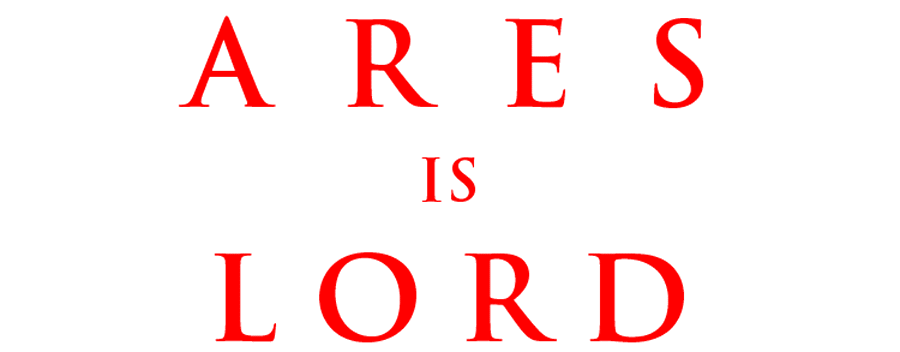




WALT WHITMAN
on
MANLY HEALTH AND TRAINING
NW
on
THE DEMISE
of
COLLEGIATE
BOXING
AFTERWORD
by
Bill Weintraub


THE LESSON TO BE DRAWN FROM IT -- WITH ONE OR
TWO OTHER MATTERS.
Sunday Morning, Oct. 31, 1858]
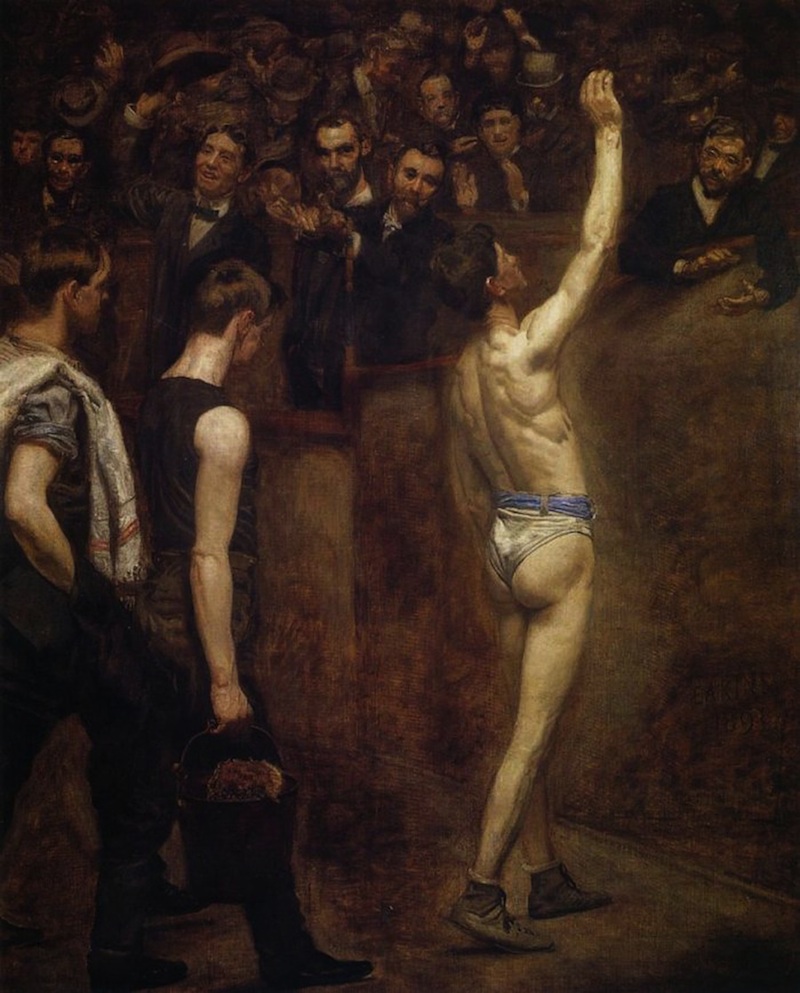
NW
on
THE DEMISE
of
COLLEGIATE
BOXING
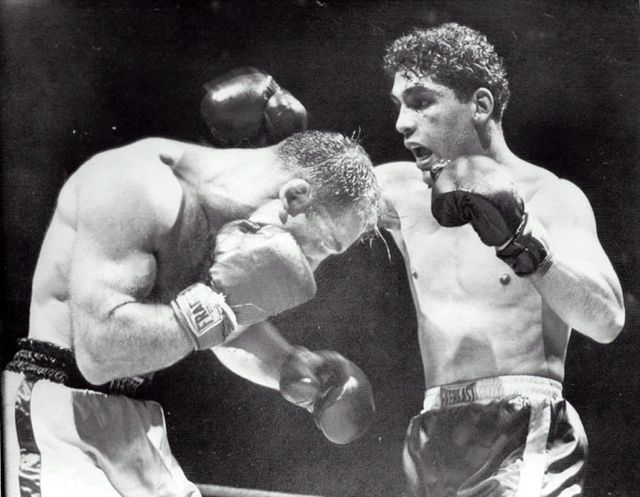
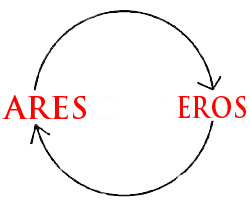
AFTERWORD
by
Bill Weintraub
That from the flesh the blood comes forth in
streams,
child of the mountain-torrent, shamed not his an-
cestry, but pulled back through bones and bowels
the spear that would pass beyond his breast, lest his
back should show dishonour, and with failing hand
hurled it back all bloody at the foe ; his loved Tay-
getus swims before his dying eyes, and the Fights
and the Lashes his mother praised [pugnae laudataque bectora matri].
In 1941, a year after JFK graduated, the U.S. entered World War II. At that time, Harvard made it mandatory for all undergraduates to participate in intercollegiate boxing training as a way of improving their wartime fitness.
In 1960, following the death of a university student from injuries received in the ring, the NCAA made the decision to do away with boxing. This is even though football has seen similar tragedies over the years -- and is scientifically proven to be more dangerous than boxing.
We have thought up different kinds of athletics and have appointed coaches for each type. We teach one how to box, another how to compete in the pankration, so that they can become used to hard work, to stand up to blows face to face, and not to yield through fear of injury.
"a triad of physical training, endurance, and courage" [appears in
Plato's Laws]
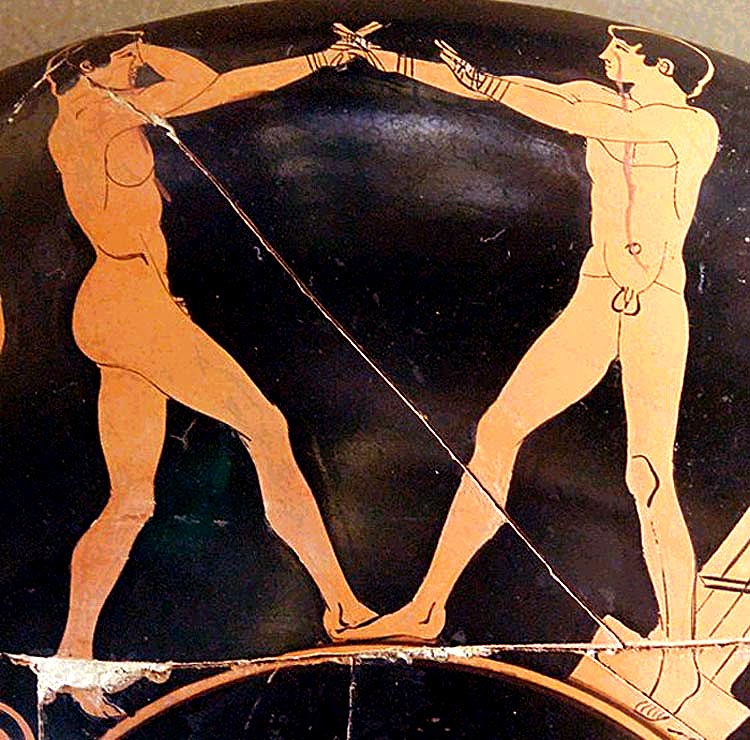
We teach one how to box, another how to compete in the pankration, so
that they can become used to hard work, to stand up to blows face to
face, and not to yield through fear of injury.
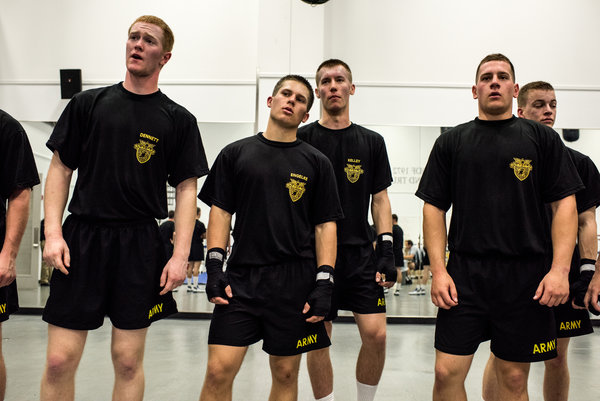
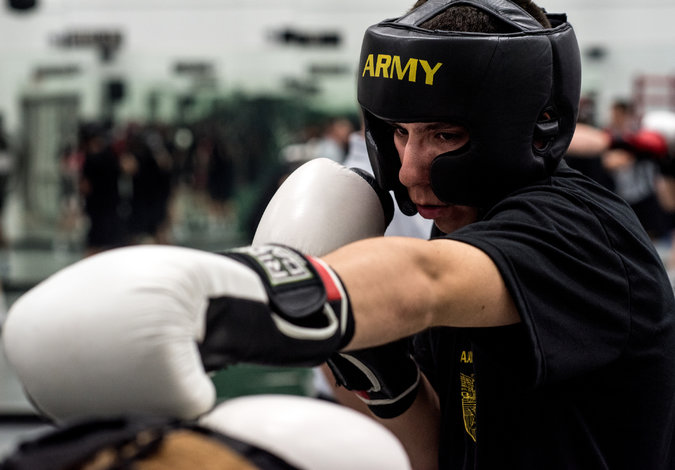
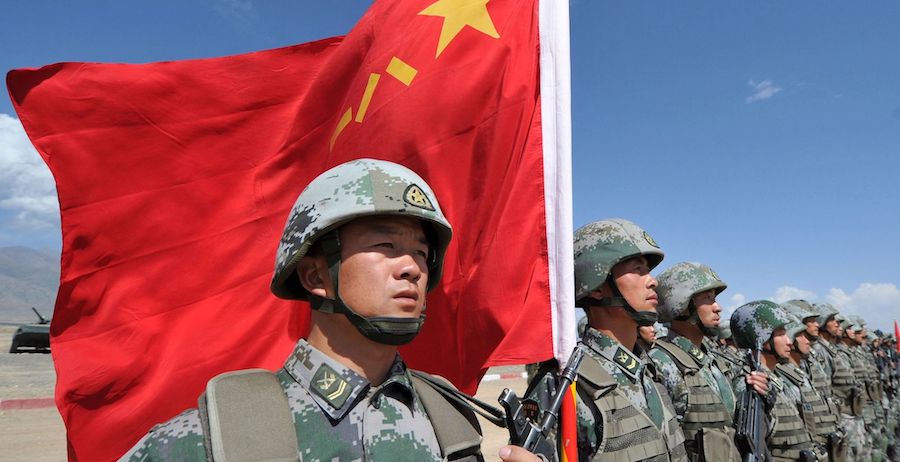
We are both warlike [polemikos] and wise [euboulos], and it is our sense of order [eukosmos] that makes us so. We are warlike, because self-control [sophrosyne] contains honor [aidos] as a chief constituent, and honor bravery [eupsychia]. And we are wise, because we are educated with too little learning to despise the laws [nomos], and with too severe a self-control to disobey them, and are brought up not to be too knowing in useless matters -- such as the knowledge which can give a specious criticism of an enemy's plans in theory, but fails to assail them with equal success in practice -- but are taught to consider that the schemes of our enemies are not dissimilar to our own, and that the freaks of chance are not determinable by calculation.
but to think that the superiority lies with him who is reared in the severest school
to instill (an attitude, idea, or habit) by persistent and repeated instruction


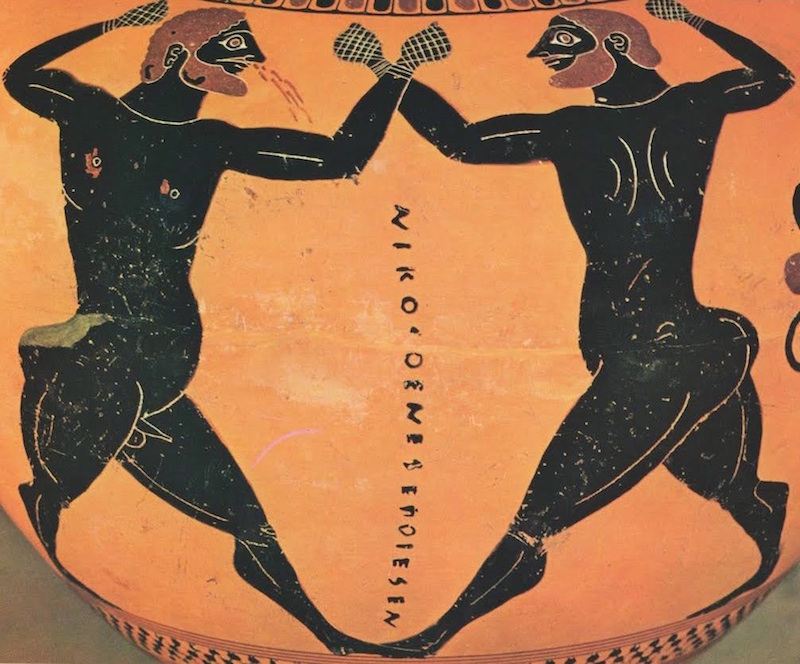
superiority lies with him who is reared in the severest school
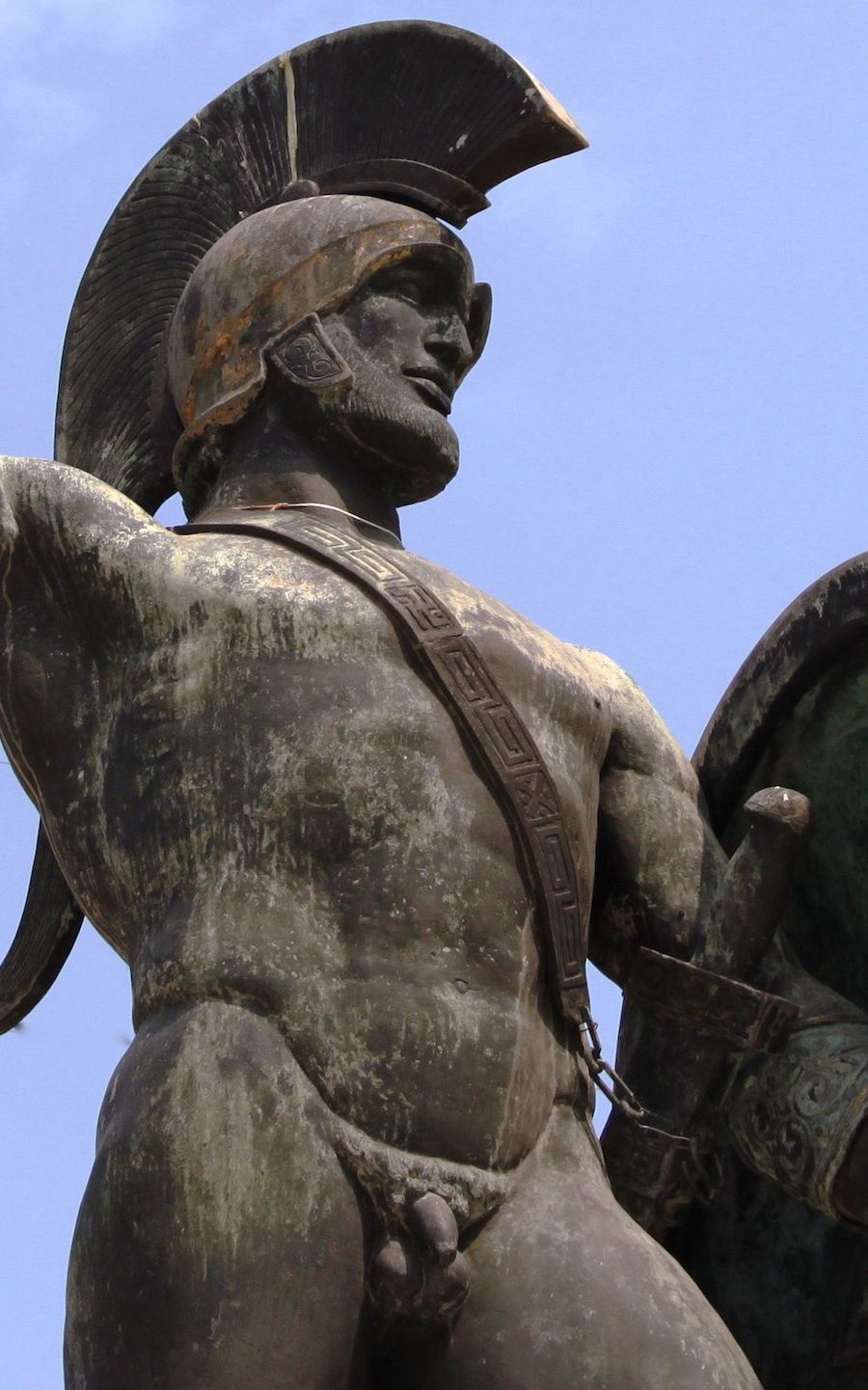
Leonidas
of Sparta






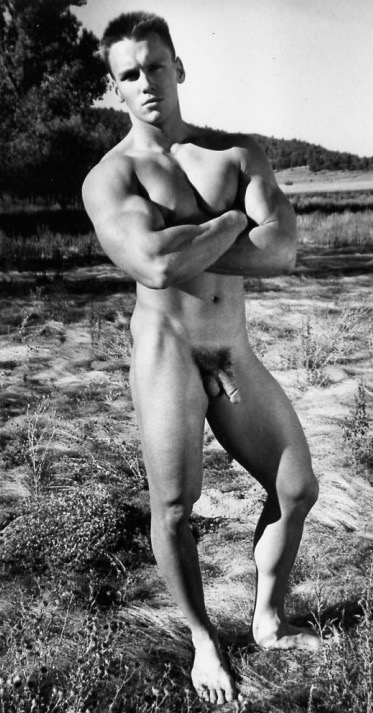
All rights reserved.
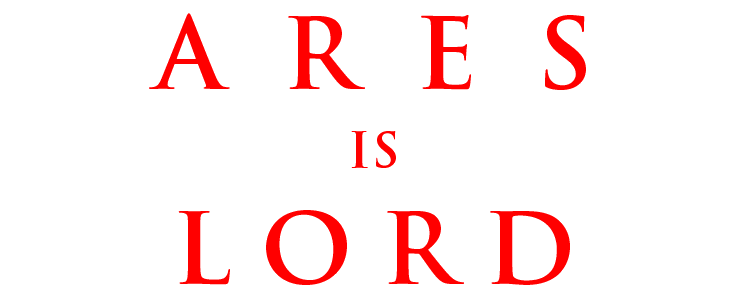
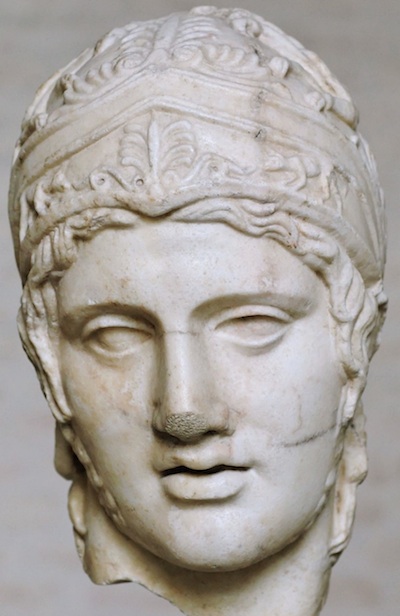

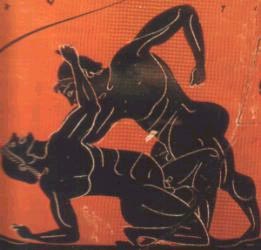


αγαπη
Discussion :

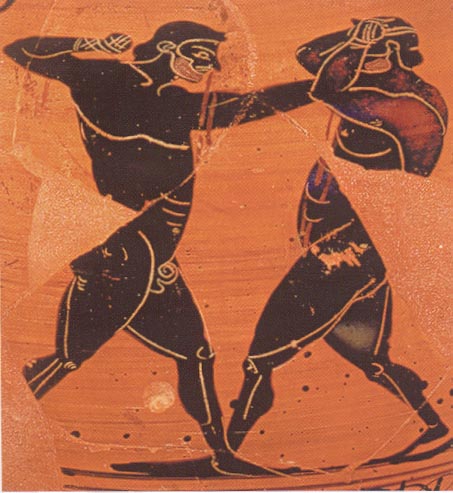






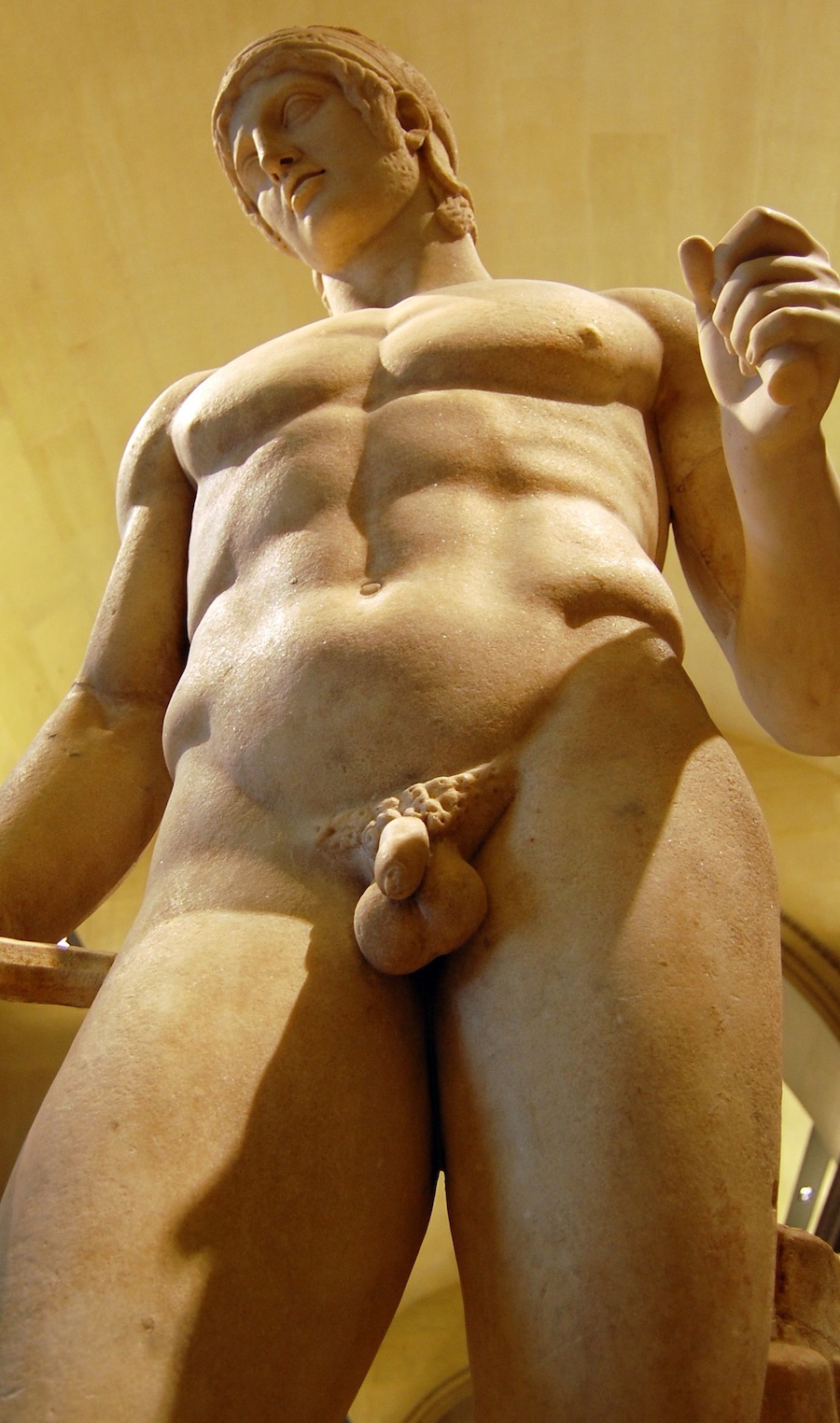






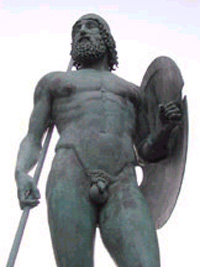







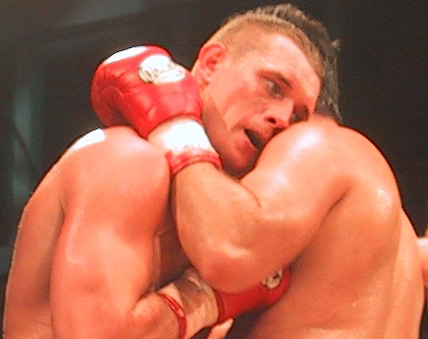
All rights reserved.